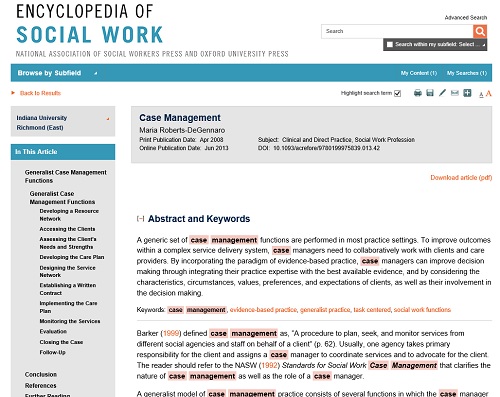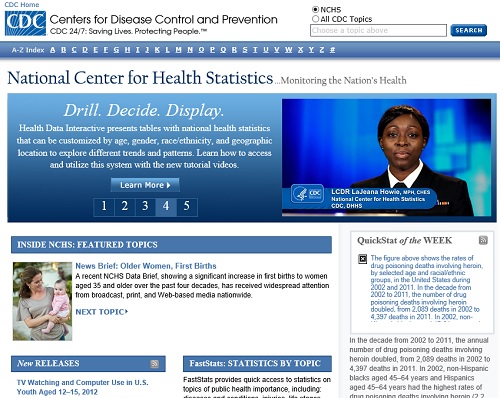In the tenth part of our summer research series, we’ll be looking at social work. Like the other disciplines we’ve examined so far, the study of social work will benefit from knowledge of the general techniques we covered in the first week. But there is plenty more to understand about this field, and how to get the best information available.
For general research, you would want to start with one of our academic databases. SocIndex, ProQuest Social Science Journals, or Social Theory are good places to begin. If you need ebooks, the Social Sciences eBook Collection and eBrary both have solid collections. And for videos, try Counseling and Therapy in Video. All our social work and social science databases can be found here.
So, let’s say that we are interested in researching the effects of person-centered theory on the process of counseling in social work practice, but that we don’t want to look at any psychological application of it. Using our general techniques, we might build a search like this one:
social work* AND (counsel* OR guid*) AND (person center* OR pct OR client center*) NOT psyc*
As you can see, we are looking for three key concepts in our question, and excluding a fourth. We have grouped synonyms together, to make sure we don’t miss a good article just because it used a different word. And while it looks time consuming, building a search this way saves you time later on looking through page after page of irrelevant articles sifting for the diamond in the rough.
But social work is a field that has significant overlap into other disciplines – economics, psychology, law, and medicine are just a few areas with potential crossover, depending on your topic. Consider using databases from one of these disciplines as a supplement. If you are researching health problems faced by those in need of care, a database like Health Source might be useful to you. Similarly, legal regulations might be covered in Lexis Nexis, and mental health needs in PsycInfo.
If you do use supplementary databases, though, you may want to include “social work*” at the beginning of your search phrase, like in the example above. While this is generally unnecessary in a social work database, where everything relates to social work, it is useful for filtering out unrelated articles in a database with a wider scope.
But the study of social work has a number of special needs and resources, as well.
ENCYCLOPEDIA OF SOCIAL WORK
This core reference set has served social workers for almost a century, and is produced by the National Association of Social Workers (NASW). Currently in its 20th edition, the Social Work Encyclopedia and its supplements are available online or physically in the library at the call number HV35.S6. Whether your topic is ethics or interventions with children or therapeutics or case management, this extensive encyclopedia and its bibliographies can greatly enhance your research. In the online version, the more than 400 individual articles can be saved as PDFs.
BIOGRAPHIES
In understanding social work, you often have to examine a particular theory, and the theorist behind it. To do this, it is helpful to have a biographical source. In addition to the previously listed Encyclopedia of Social Work, which includes over 200 biographies of prominent theorists and practitioners (choose ‘biographies’ in the ‘browse by subfield’ box), you might also try Biography in Context (search ‘by occupation’ and type ‘social worker’, or by name with a specific person).
STATISTICS
The best single source for statistical data is usually the United States government, and that is true in the social services, as well. One major resource is the Center for Disease Control’s FaStats, which includes a number of metrics concerning the health and needs of the US Population. Another source of interest is the County and City Data Book, produced by the US Census Bureau. With many tables on social services uses and expenditures, it is a good way to find major benchmarks. It is also good for comparing local data to the rest of the state or to the country.
With so many social work resources available to you, you’ll be able to do great research for projects on any topic. But if you have any questions, please contact us at iueref@iue.edu!



